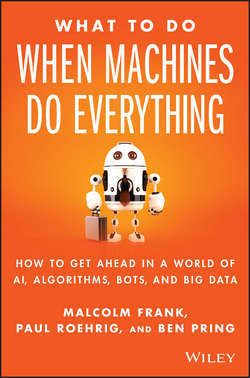Читать книгу What To Do When Machines Do Everything - Roehrig Paul - Страница 4
На сайте Литреса книга снята с продажи.
1
WHEN MACHINES DO EVERYTHING
ОглавлениеArtificial intelligence has left the laboratory (and the movie lot) and is in your building. It's in your home. It's in your office. It's pervading all the institutions that drive our global economy. From Alexa to Nest to Siri to Uber to Waze, we are surrounded by smart machines running on incredibly powerful and self-learning software platforms. And this is just the beginning.
To date, we've been enjoying – without even really noticing – various forms of “weak” artificial intelligence (AI). It's how Amazon recommends just the right gift. How Netflix suggests the perfect film for your Sunday evening. Or how Facebook fills your newsfeed. These forms of AI have been welcome little helpers, making our days just a bit easier and more fun. Once we start using them we stop thinking about them. In just a few short years, these machines have become almost invisible to us in our personal lives.
Now AI is transitioning from being our little daily helper to something much more powerful – and disruptive – as the new machines are rapidly outperforming the most talented of us in many endeavors. For example:
• Games of intellect: AI platforms can now out-compete us at some of our most challenging games – Jeopardy!, Chess, and Go. Google's AlphaGo beat world champion Go player Lee Sedol by a score of 4–1 in March 2016.1 This was a convincing win, but not a rout. Yet with the current rate of technological advancement, in just a few years it will be inconceivable for a human to beat the new machines in such games of the mind.
• Driving: The driverless car, while still relatively nascent, is already a better driver than the average person. According to a Virginia Tech study, human-driven vehicles are involved in 4.2 crashes per million miles vs. 3.2 crashes per million miles for the automated car.2 This disparity in safety will undoubtedly grow considerably in the next few years, and driverless cars, which never text behind the wheel or drive drunk, may soon become mainstream.
• Trading: In 2015, six of the top eight hedge funds in the United States earned around $8 billion based largely – or exclusively – on AI algorithms.3 The machine has already won in stock picking.
• Health care: In medicine, the new machine is quickly surpassing the capabilities of human radiologists. Researchers at Houston Methodist Hospital utilize AI software, which interprets results of breast X-rays 30 times faster than doctors and with 99 % accuracy. By contrast, mammograms reviewed by humans result in unnecessary biopsies nearly 20 % of the time.4
• Law: In the legal profession, AI-enhanced computer systems are conducting discovery and due diligence far better, faster, and cheaper than the most talented team of paralegals in a white-shoe law firm. Multiple studies predict that the vast majority of paralegal work can soon be automated. We may reach a point in the not-too-distant future when relying only on humans for discovery might be grounds for malpractice.
We could go on and on with many more examples, but the point is clear; the new machines have already surpassed human capability in many ways. Moreover, with the geometric growth in the power and sophistication of these platforms, this is only a preview of coming attractions.
Thus, this rapid expansion of AI leads us to ask some big questions:
• Will a robot take my job away?
• Will my company be “Ubered”?
• What will my industry look like in 10 years?
• Will my children be better off than I am?
In the coming pages, we will answer these questions in a structured and practical manner. Based on our cumulative 100 years of experience analyzing and charting shifts in business and technology, we are fully convinced that we're now moving into a new economic era, one that will change the nature of work and the basis of competition in every industry. In this new economy, we will witness an expansion of what is possible and move from machines that do to machines that appear to learn and think.
1
Christopher Moyer, “How Google's AlphaGo Beat a Go World Champion,” The Atlantic, March 28, 2016, http://www.theatlantic.com/technology/archive/2016/03/the-invisible-opponent/475611/.
2
“Automated Vehicle Crash Rate Comparison Using Naturalistic Data,” January 8, 2016, http://www.vtti.vt.edu/featured/?p=422.
3
Emel Akan, “World's Top Hedge Fund Managers Took Home $13 Billion in 2015,” Epoch Times, May 17, 2016, http://www.theepochtimes.com/n3/2067771-worlds-top-hedge-fund-managers-took-home-13-billion-in-2015/.
4
Todd Ackerman, “Houston invention: Artificial Intelligence to read mammograms” San Antonio Express-News, Sept. 16, 2016, http://www.expressnews.com/local/prognosis/article/Houston-researchers-develop-artificial-9226237.php.
